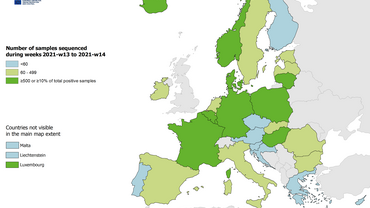Individuals who experience more severe COVID-19 may be at a higher risk of post COVID-19 condition symptoms
A recent ECDC report, ‘Prevalence of post COVID-19 condition symptoms: A systematic review and meta-analysis of cohort study data stratified by recruitment setting’ reveals that post –COVID-19 symptoms appear to be more prevalent amongst patients from hospital settings when compared to community settings.
This indicates that the risk of post COVID-19 condition may be higher amongst individuals who experience more severe COVID-19 disease.
A wide range of physical and psychological symptoms have been reported by individuals at least 12 weeks following a SARS-CoV-2 infection. However, symptom prevalence estimates must be interpreted with caution as the majority of studies lacked non-infected comparator groups, which may lead to overestimation of symptoms specifically attributable to prior SARS-CoV-2 infection.
Five post COVID-19 symptoms (fatigue, shortness of breath, depression, headache and dizziness) were noted to be more prevalent amongst patients from hospital settings than community settings. In most studies conducted on post COVID-19 condition, it is difficult to ascertain if the reported symptoms are uniquely caused by SARS-CoV-2 infection. To determine this, studies would also need to monitor reported symptoms amongst non-infected individuals and correct possible overestimations.
The ECDC report is based on studies conducted in the European Union (EU)/European Economic Area (EEA), the United Kingdom, United States, Canada, Australia and New Zealand. Whilst the findings of the review may assist policymakers and public health authorities in estimating the burden of post COVID-19 condition and support the planning of rehabilitation services during the post-acute phase of the COVID-19 pandemic, there are some limitations to the work.
Due to the time lag between study design, implementation and publication, results in the systematic review reflect the status quo following the first waves of the pandemic (i.e. the pre-Omicron period), where historical variants were in circulation and population-level immunity was markedly different.
There are still many unknowns, in terms of current and future risks to populations for post COVID-19 condition in the context of increased levels of vaccination and hybrid immunity. Looking ahead, additional large-scale population-based studies with appropriate control groups are required to assess which long-term symptoms are specifically attributable to SARS-CoV-2 infection and their association with a wide range of demographic and clinical risk factors.
Read the report
Evidence assessment
Prevalence of post COVID-19 condition symptoms: a systematic review and meta-analysis of cohort study data, stratified by recruitment setting
The primary aim of this systematic review and meta-analysis was to estimate the prevalence of symptoms of post COVID-19 condition, stratified by recruitment setting (community, hospital and Intensive Care Unit (ICU)) as a proxy for disease severity.






